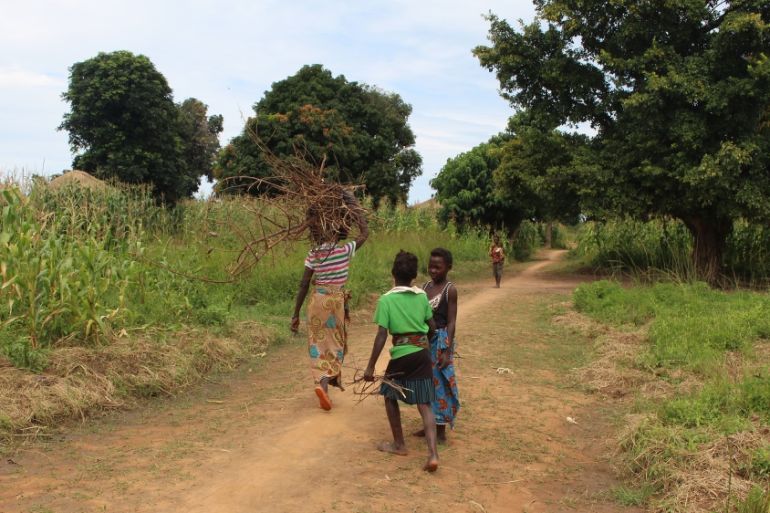In Zambia, poverty and social exclusion spur teenage pregnancies
With poor education facilities on Mbabala island, which is home to 2,000 people, children engage in sex at an early age.

Mbabala, Zambia – Deep inside Bangweulu, the largest lake in Zambia, lies Mbabala, a sandy island home to about 2,000 people.
From a distance, a dozen fishermen move around the water, slowly rowing their old, wooden boats in search of fish.
Keep reading
list of 4 itemsWoman, seeking loan, wheels corpse into Brazilian bank
UK set to ban tobacco sales for a ‘smoke-free’ generation. Will it work?
Poland lawmakers take steps towards liberalising abortion laws
At the island’s shores, children wash utensils and clothes as others prepare to bathe.
It is a sunny Saturday morning and Irene Bwalya emerges from her tall maize plantations engulfing her modest one-bedroom house. She is breastfeeding her new son.
“Go inside and get me the brown mat,” the mother of seven angrily tells one of her daughters, who is sitting outside. “Spread it here and start cleaning the house. It’s getting late.”
In Mbabala, there is a rising number of teenage pregnancies with girls as young as 13 becoming mothers.
Bwalya’s 18-year-old daughter, her first-born girl, was one of them.
The then-14-year-old revealed her pregnancy to her mother in 2014.
“I was in pain. My daughter started developing pregnancy symptoms but I kept ignoring them since she was still young,” she said.
“After the symptoms kept on, she confessed about her pregnancy. I thought she was raped at first but she denied and went ahead to show me the man who was responsible.”
According to UNICEF, in Zambia, three in 10 young women aged 13-19 have started bearing children – that is, they have given birth already or are currently pregnant with their first child.
The rate of teenage pregnancies is about 29 percent and, as a result, about 16,000 of adolescent girls are dropping out of school.
![Irene Bwalya sits outside her house in Mbalala island. Her first-born daughter was pregnant when she was 14 and then again at 16 [Osman Mohamed Osman/Al Jazeera]](/wp-content/uploads/2019/04/af623306a83b4476a6bef61e65e975d0_18.jpeg)
Across Mbabala, there is only one primary school.
Students whose families can afford high school must travel to the mainland: a four-hour boat ride which costs $40.
This is hard, says Bwalya, who has no source of income.
Her daughter did not attend high school and found herself idol most of the time.
“The only way out to a better life is education. I do not have anything to support my children to further their education in the mainland,” she said.
In Zambia, according to government figures, 54 percent of the Southern Africa nation’s 18 million people live below the poverty line.
In Mbabala, fishing and agriculture are the main sources of income.
Kedrick Kasabwe, a 50-year-old man who lives on the island, said residents are extremely poor.
“Apart from pregnancies, STIs and HIV are very high. Our children are engaging in sexual activities due to poverty and idleness. We only have a primary school and once a 13-year-old is done, they become idle, ending up engaging in sexual activities,” he said.
The father of seven has campaigned for sex education.
“I started by example. I took my 14-year-old daughter to the clinic and [she was given] birth control implants to make sure she doesn’t get pregnant at her young age. We want better lives for our children,” he said.
Together with a group of concerned elders and parents, he organised meetings with young teenagers, providing a space for discussion without judgement.
The message, explained Kasabwe, will not be heard if only one gender is targeted.
“We need to holistically inform our youth that you can abstain from sex. If you cannot abstain, these are the safety procedures to go about it,” he said.
“The problem is that these young boys and girls are sexually active without knowledge of its dangers. Our job is to teach them how to go about it and avoid unnecessary pregnancies and diseases.
“We cannot stop young and idle teenagers from engaging in sexual activities. But, through the talks, we can curb its dangers.”
Other parents have also educated their children about contraceptives.
According to records seen by Al Jazeera at Mbabala’s only health clinic, in the last six months, 22 teenagers were given birth control contraceptives.
The youngest was 13 years old.
!['Our children are engaging in sexual activities due to poverty and idleness,' says 50-year-old Kedrick Kasabwe, who has campaigned for sex education [Osman Mohamed Osman/Al Jazeera]](/wp-content/uploads/2019/04/7da599b0d78f4852997703414369ecae_18.jpeg)
Nason Bwalya, the area’s district commissioner, says the government is aware of the numbers.
“In this district, some places like Mbabala have an accessibility challenge.
“As the government, we are planning to put up more health facilities and schools so as to bring services close to the people. Once we do this, poverty levels will go down,” Bwalya told Al Jazeera.
But access to contraceptives will not stop teenagers from having sex, explained Monica Atim, a sexual reproductive health adviser at Voluntary Service Overseas, a UK Charity.
Education and awareness campaigns are essential, she added.
“Teenage pregnancies are very dangerous to these young girls. This is because their bodies are not yet fully mature to handle the dangers and risks that come with pregnancy. This leads to complications like over bleeding when giving birth, fistula and, in some cases, death,” she said.
Bwalya, the mother of seven, is aware of the dangers.
A year after giving birth, her daughter became pregnant again, prompting her to take her other daughters to get contraceptives.
“It was too much. I am struggling to take care of my own seven children. Having grandchildren is a burden at this time,” she said. “I just want my daughters to have a decent life and become mothers when the time is right.”
![In Mbabala, fishing and agriculture are the main sources of income [Osman Mohamed Osman/Al Jazeera]](/wp-content/uploads/2019/04/4d9a95c7f89a4218ab3d9a0aa1070587_18.jpeg)